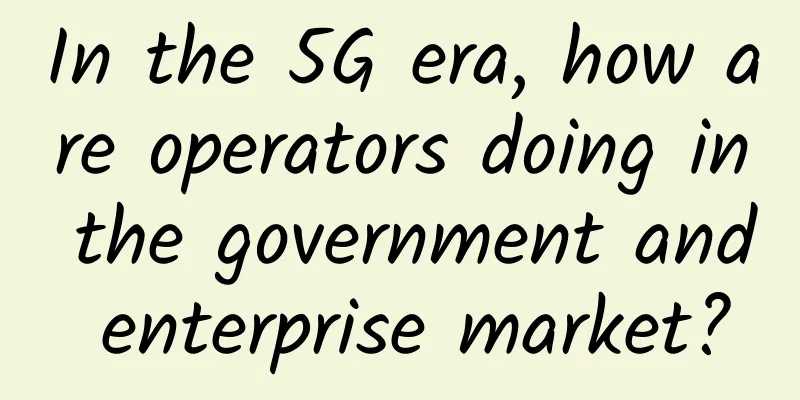In the 5G era, how are operators doing in the government and enterprise market?

|
4G has just entered a stable development period, and 5G has followed. Such a rapid transition from 4G to 5G caught the operators off guard. They had originally made drastic investments in 4G, thinking that it would ease the pressure of increasing revenue, but they did not wait until the benefits of 4G were fully realized, and they had to carry out a new round of capital investment and resource allocation. The operators are now in a situation where they are surrounded by enemies.
On the one hand, the traditional public market has become saturated and the competitive pressure is huge, resulting in very unsatisfactory overall revenue growth for operators. On the other hand, today's revenue growth for operators basically all comes from the development of government and enterprise business and revenue growth. However, in addition to the competition among traditional operators, the government and enterprise market also faces the participation of Internet companies such as BAT, which puts higher demands on the operation of operators themselves. How to grasp the industry trends of the government and enterprise market, find the right partners, and reasonably allocate resources have become key factors for operators to break into the government and enterprise market. The development of the operator government and enterprise market has gradually become an important factor affecting the competitive landscape of the communications industry. What is the current development status? 1. Telecommunications growth slowed down and development stagnated Taking Guangdong Telecom as an example, as of October, Guangdong Telecom's overall government and enterprise market revenue decreased by about 2% year-on-year. Compared with the rapid development of the government and enterprise market in the past, this year's development has declined significantly and the revenue growth is poor. The main reasons are: (1) The traditional two-line business was suppressed by competitors, the overall user scale growth was weak, and there was a downward trend, resulting in poor revenue growth; (2) The revenue of government and enterprise ICT business declined sharply year-on-year. The revenue scale of the telecommunications government and enterprise market is the highest among the three operators, and it has maintained a good development momentum. However, when the operator shifted its resource focus to the government and enterprise market, the fierce market competition caused the development of the telecommunications government and enterprise business to gradually slow down or even show negative growth, and the industry competition further intensified. 2. China Unicom's rapid growth and catching up Guangdong Unicom's government and enterprise market has developed rapidly this year. As of October, the overall government and enterprise market revenue has increased by about 10% year-on-year. Among them, the five key businesses of ICT, IDC, dual-line, BPO, and cloud computing have all increased their revenue by more than 100 million yuan. It can be seen that Unicom's government and enterprise business has shown an all-round development trend this year, and the proportion of government and enterprise revenue and the contribution to revenue growth have increased significantly, becoming the main source of driving overall revenue growth. This is due to Unicom's heavy investment in government and enterprise business, and its efforts to tackle key industries such as government affairs, medical care, and industrial Internet, and have achieved good results. 3. Future Development Trends of the Government and Enterprise Market The arrival of 5G will have a profound impact on the development of the government and enterprise markets. Both traditional and new businesses will have certain development opportunities: First, the integration between traditional and new businesses will be closer. With the development of enterprise Internet, the demand for communication services in the 5G era will be more comprehensive. Small-scale information solutions for small and medium-sized enterprises will become the mainstream demand, including basic networks (mobile networks + broadband + dedicated lines), mobile terminals, mobile offices, big data and cloud storage, etc. Operators need to reasonably formulate product solutions based on their own businesses and resources to highlight their personalized and differentiated advantages. Secondly, the boundaries of government and enterprise business are broader, and operators need to allocate resources more reasonably. In the 5G era, more business forms and products will be derived. In the context of cost reduction, operators need to concentrate their own advantageous resources to make key breakthroughs. For some businesses with small business volume and relatively low profits, they can adopt outsourcing or cooperative construction models to operate, so as to achieve the development effect of increasing both volume and revenue. Thirdly, optimization and upgrading of government and enterprise services is imperative. Traditional businesses of operators, such as government and enterprise fixed-line telephones and fixed-line dual-line services, are facing more intense market competition. It is difficult to expand with only a single business. Therefore, operators need to upgrade their existing products and services, such as providing DDOS security protection services, acceleration services, emergency services, etc. Only in this way can they maintain and retain old users and avoid user loss and defection. Finally, new businesses such as cloud computing and the Internet of Things will see a substantial growth in the short term. 5G is an era of the Internet of Everything. Massive data storage and interconnection needs will drive the scale growth of cloud computing and the Internet of Things. For operators, although the revenue from cloud computing and the Internet of Things is not large, it is very helpful to increase the overall incremental revenue. They must increase investment and resource matching. If resources are limited, they can reduce operating costs through social cooperation. In an environment where the overall revenue growth of operators is slowing down or even experiencing negative growth, appropriately shifting the focus of operations to government business can be said to be the only way for operators to solve the current revenue growth dilemma. However, how to rationally plan the layout and allocate resources will be the key to whether the operator's government business can continue to achieve simultaneous growth in volume and revenue. Only in this way can they gain an advantage in the more intense market competition. |
<<: Counterpoint data shows the future of 5G in 2020
Recommend
TCP
[[381851]] This article is reprinted from the WeC...
Do you want to switch to a 5G package? Here is a comprehensive comparison of 5G packages
With the launch of iPhone 12, 5G finally filled t...
A brief discussion on IPv6 intrusion and defense
Preface Recently, some customers started the tran...
Why can't the 5G package be changed back to 4G?
Recently, the "5G-forced" incident has ...
Building 5G and expanding 4G: 2G/3G network withdrawal is in progress around the world
The COVID-19 pandemic has driven the demand for d...
DiyVM: Hong Kong CN2, US CN2, Japan Osaka, 2G memory package starting from 50 yuan/month
DiyVM was founded in 2009 and is a Chinese hostin...
Link aggregation, redundancy, stacking, and hot backup of core switches
1. Link Aggregation Link aggregation is the combi...
How do operators judge a reliable IoT project? The thoughts of operators’ IoT personnel
Previous article: "The Internet of Things in...
The 2G era will not come to an abrupt end; network transformation requires the support of the Internet of Things
Recently, China Unicom announced that it will car...
Megalayer: US servers start at 199 yuan/month, US 100G high-defense servers start at 299 yuan/month
Megalayer's promotion this month still offers...
[Black Friday] Ramnode offers free gifts for as much as you charge, cloud servers in data centers in Los Angeles/Seattle/New York/Netherlands
The last time I shared information about Ramnode ...
Research shows: 5G will drive the development of the digital economy
How does 5G fit into this? As remote work, video ...
There is no optical communication without optical modules, is it true?
Over the past 100 years, human beings have develo...
How is the operator's name displayed on your phone?
[[379606]] This article is reprinted from the WeC...
The IPv6 in-depth promotion meeting was held in Beijing. Why does China want to promote IPv6 "desperately"?
Recently, the "Conference on Deepening the I...









